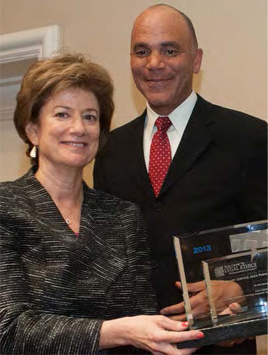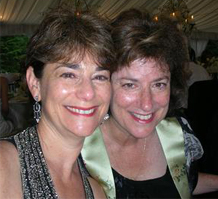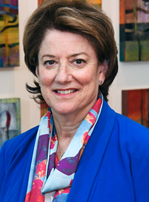Nina Cortell rose from the counsel table to make her first oral argument to the U.S. Court of Appeals for the Fifth Circuit in 1981.
The young lawyer felt comforted, as opposing counsel had presented his side in the complex securities dispute without much push-back from the three-judge panel. Suddenly, the docile court became a hot panel.

“I barely got my name out when I was hit with a barrage of questions — and that continued for the entirety of my time before the court,” says Cortell, who represented a real estate developer who was challenging a contract because the counter party was not a registered broker.
“This led my opposing counsel to be a bit smug on the flight back [from New Orleans to Dallas],” she says.
Months later, the lawyers realized they had misread the appellate court, which issued a unanimous opinion in favor of Cortell’s client.
“The other lesson I learned [in that case] was not to stay on the second floor of a hotel in the French Quarter, facing Bourbon Street, the night before argument,” she says. “The partying on Bourbon Street was loud and went late, making an anxious night even more challenging. That’s the last time I made that mistake. Since then, I haven’t stayed in the French Quarter on the night before an oral argument.”
Nearly four decades later, Cortell is a senior partner at Haynes and Boone in Dallas and is widely respected as one of the best and most successful appellate lawyers in Texas. She broke through glass ceilings, gracefully convinced leaders of the legal profession to hire and promote more women and proved through her actions that gender was not a factor when it comes to being a great advocate.
Lawyers who know Cortell say she is never meek or shy to speak up, but always does so in a respectful and often quiet manner.
Cortell has successfully argued scores of major cases to the state and federal appellate courts on behalf of some of the biggest corporate clients in Texas, including American Airlines, AT&T, Exxon Mobil, Energy Transfer Partners and Trinity Industries.
“We searched for the best appellate lawyer to handle our case and everyone pointed us to Nina,” says NextEra Energy General Counsel Charles Sieving. “Nina did not disappoint.
“Nina mastered the record just as good as the trial lawyer did in our case,” Sieving says. “She is able to isolate the key issues and then crisply and clearly advocate the views of her clients.”
 Cortell has received nearly every award that legal organizations hand out. The University of Texas School of Law gave her the Distinguished Alumni Award. The Dallas Bar named her Outstanding Lawyer of the Year in 2009. The Texas Center for Legal Ethics honored her with the 2013 Jack Pope Professionalism Award.
Cortell has received nearly every award that legal organizations hand out. The University of Texas School of Law gave her the Distinguished Alumni Award. The Dallas Bar named her Outstanding Lawyer of the Year in 2009. The Texas Center for Legal Ethics honored her with the 2013 Jack Pope Professionalism Award.
She is a founding member of the Center for Women in the Law at the University of Texas.
Haynes and Boone Managing Partner Tim Powers says Cortell has been a huge reason for the firm’s success during the past half-century, pointing out that she was Haynes and Boone’s first woman lawyer, first woman partner and first woman to serve on the executive committee.
“Nina is a quiet, low-key leader, who has the absolute respect of every lawyer at this firm,” Powers says. “She brings wisdom, great judgment and an amazing intelligence to every issue and every case.”
To understand Cortell’s success, thought processes and drive, you must examine her family and upbringing. Her knowledge and expertise are learned, while her intelligence and drive are inherited. She is, after all, the only Lion of the Texas Bar who is a descendant of Albert Einstein. Her grandmother and Einstein were cousins.
Anneliese Amelie Feibel, Cortell’s mother, was born in Frankfurt, Germany and later moved to Munich, where she worked as an au pair on the very block where Adolph Hitler lived. Her mother and two siblings were kicked out of German public schools as the result of anti-Jewish laws. She eventually fled to London and later to the U.S., where her brother became a furniture maker in Dallas.
When Hitler took over Luxembourg, Cortell’s grandparents fled to Marseilles, where they hid for a few years. But in May 1944, shortly before D-Day, they were captured and sent to Auschwitz, where they were murdered by the Nazis.
Cortell’s father, Walter Louis Kocherthaler, was born in Madrid to a prominent German-Jewish family. He studied at Cambridge and the Sorbonne before moving to the U.S. in the mid-1930s, seeking a livelihood in the arbitrage business in New York City. He became a U.S. citizen when he joined the Army during World War II, serving in the intelligence branch as a translator for prisoners of war.
Feibel, who worked as a clerk at Republic National Bank, and Kocherthaler, who was a traveling salesman, met on a blind date in 1949 set up by mutual friends.
 “After that first date, my mother told her friends from work that she had met the man she would marry,” Cortell says. “They married seven weeks later.
“After that first date, my mother told her friends from work that she had met the man she would marry,” Cortell says. “They married seven weeks later.
“My mother was a gregarious character with a heavy German accent. She was a German Lucille Ball,” she says. “My dad changed his last name to Cortell. He was a gentleman in the greatest sense of the word – a true European, intellectual and soft-spoken.”
Even though Cortell grew up in a modest, one-story home, one room was dedicated as a library with books from floor to ceiling. Her father loved history and would read stories from books he was reading at bedtime. English was the second language in her home; German was often spoken. Education was a priority for her parents.
“I was raised [to understand] that I had to take care of myself,” she says.
For third grade show-and-tell, Cortell took Einstein’s pipe to school. One boy, she remembers, was so awed that he promised to never wash his hand ever again after holding the genius’s pipe.
In 1952, Einstein wrote a one-page note in German to Cortell’s parents congratulating them on Nina’s birth. He signed it, “Your Albert.”
Cortell graduated summa cum laude from the University of Texas in three years and then received her law degree in 1976 from UT, where she excelled in moot court.
During her second year, she set up interviews with 15 law firms. She received only one offer.
“People ask why I chose Haynes and Boone,” she says. “Well, Haynes and Boone chose me.”
Cortell was the 13th lawyer at Haynes and Boone, which now boasts more than 600 lawyers worldwide. Her first hourly billable rate was $50, roughly one-eighteenth what it is today. In 1982, the firm made Cortell its first woman partner.
No single lawyer had more of an impact on Cortell than legendary trial lawyer George Bramblett, who died last year.
“The joy and love George had practicing law was infectious,” she says. “He taught us by being a superior role model.”
In an interview two months before his death, Bramblett told The Texas Lawbook that hiring Cortell was “the best decision I ever made as a lawyer.”
Cortell worked with Bramblett on many of her most important cases, which impressed upon her the need to remain professional and ethical even while zealously advocating for the client. During her decades-long career, Cortell has been thrust into some of the biggest civil lawsuits of her generation.
For example:
-
- During her rookie year at Haynes and Boone, she became involved in representing Texas International Airlines, which later became Continental Airlines, in litigation trying to force Southwest Airlines out of Love Field. The litigation lasted on and off for many years and eventually resulted in Continental Airlines being able to conduct flights out of Love Field.
-
- She represented Exxon Mobil against Lloyds of London when the global insurer refused to cover billions of dollars in costs spent by the Irving energy giant as part of the cleanup of the Valdez oil spill in Alaska.
-
- American Airlines turned to Cortell to successfully convince the court to significantly reduce a jury award against the Fort Worth-based airline in a dispute over whether signs with flight information on highways leading to the airport caused traffic crashes.
-
- Cortell also represented Texas public school systems in the decade-long legal battle over the financing of education. She obtained a ruling from the Texas Supreme Court overhauling the Texas public school finance system.
“It has been a true honor and privilege to represent the school children of Texas to improve our educational system,” she says. “The issue was ripeness. The case had been dismissed below and we were arguing that the Court should allow the case to proceed, to ensure needed reforms.”
Cortell concluded her argument at the Texas Supreme Court with a favorite quote from a Jewish text (Pirke Avot): “It is not incumbent upon you to complete the task, but neither are you free to desist from trying to do so.”
The justices ruled for Cortell’s clients, which set the stage for the ultimate victory in the case.
Like all of the other Lions of the Texas Bar, Cortell has experienced some embarrassing courtroom moments. One involved a contract dispute going to trial in 1978 – her second year of practice.
“It began horribly. I had been called to trial in two cases on the same day and for some reason thought a different case would proceed,” she recalls. “So, I spent the weekend completing my preparation … for the wrong case.
“I learned this when I went down to court on Monday morning, told Judge A that I would be trying a case in Judge B’s court,” she says. “Judge A overruled me, called Judge B to say I would proceed in Judge A’s court that very afternoon.
“That was followed by a very slow walk back to my office, to switch out the files in my trial briefcase and return to court to try a case I was not fully prepared to try,” she says.
Thankfully, the weather gods intervened that night and brought an unusual amount of snow to Dallas, which caused court to cancel the next day.
“The trial was re-set several months later,” she says. “You may rest assured that I was fully prepared for that setting — and happy to say I won the case. I’ve never been caught that flat-footed again.”
Cortell’s father died when she was 19, but her mother, who died in 1991, was able to see her argue a case to the Fifth Circuit in New Orleans.
“Mom was very concerned after the argument because Judge [Irving L.] Goldberg spoke harshly to me during oral argument,” Cortell says. “Mom was very pleased when I won the case.”
 At age 65, Cortell shows no sign of slowing down. It is clear that she is in higher demand than ever before by corporate clients – especially those facing litigation at a bet-the-company level.
At age 65, Cortell shows no sign of slowing down. It is clear that she is in higher demand than ever before by corporate clients – especially those facing litigation at a bet-the-company level.
Trinity Industries hired Cortell as part of the legal team that last month successfully appealed a $663 million False Claims Act judgment stemming from a whistleblower’s claim regarding guardrail end terminals that were approved for use by the Federal Highway Administration.
Cortell’s current docket includes representing the Dallas Police and Fire Pension System in its ongoing legal disputes regarding its pension plan and ETP in its $535 million partnership disputes with Enterprise Products.
She also represents ExxonMobil in its legal battles with the state attorneys general of Massachusetts and New York regarding state investigations into allegations that the energy company knew but hid research on climate change.
“Nina is a superb attorney who always demonstrates the highest degree of integrity and intellectual advocacy in the courthouse,” Exxon Mobil General Counsel Randy Ebner says. “She is among the most respected advocates in the legal community and brings unparalleled civility into the courtroom.
“Her appellate advocacy skills, including her strategic analysis, creativity and phenomenal preparation results in the best possible representation for her clients,” Ebner says. “As a seasoned advocate, her passion and dedication to the profession has established her as a role model for future generations of attorneys.”
